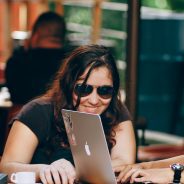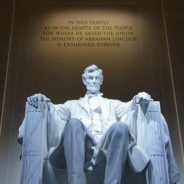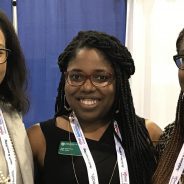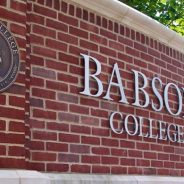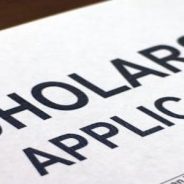Search results for forte foundation:
Top MBA Recruiters: AT&T
Finding employment after graduating from an MBA program can be a challenge for some. Thankfully, new MBAs are never alone in the process. From companies that actively recruit talent from business schools throughout the country, to MBA programs themselves helping to facilitate interviews and job referrals for their students, students should be sure to take advantage of resources available to them.
A look at 2017 employment data from a top MBA program like the University of Chicago’s Booth School of Business reveals the overwhelming trend: a whopping 89.2 percent of students found employment through university-facilitated avenues, be it on-campus recruitment and interviews, networking events, or through a Booth-facilitated summer employer. The success of campus recruitment benefits everyone, not only because universities are willing to open their doors and advocate for their students, but because top companies go out of their way to recruit young talent and create opportunities for them.
One such company is American multinational telecommunications holding company, AT&T. Founded in 1983 as the Southwestern Bell Telephone Company—part of the Bell Telephone Company with roots in the late 19th century—today AT&T has more than 254,000 employees worldwide and $190 billion in revenue. With a commitment to MBA graduates through internships and early career development programs, AT&T makes the grade as a top recruiter and employment destination for MBAs.
What Is An AT&T Career Like for MBAs?
It should be no surprise that MBAs love working at AT&T when you know the kind of investment this company makes in the educational development of its employees. In 2016, AT&T spent $250 million on employee training and invested roughly 20 million hours into the process. With so many opportunities for ambitious team members to accelerate their careers through leadership and development programs, this is the perfect company for those looking to quickly rise into leadership roles.
AT&T has been awarded many times for its workplace culture, including being named on Fortune‘s ‘100 Best Companies to Work for in 2018‘ and 3rd overall on the Diversity Inc. list of the ‘Top 50 Companies for Diversity‘ in 2018.
Of course, it pays to have an AT&T career, even beyond a positive workplace culture. According to PayScale data, MBA graduates at AT&T earn an average annual salary over $95,000. This can range as high as $142,000 for those in operations management. Employees, including interns, are rewarded with competitive compensation and benefits, including paid holidays, time off, and discounts for AT&T products.
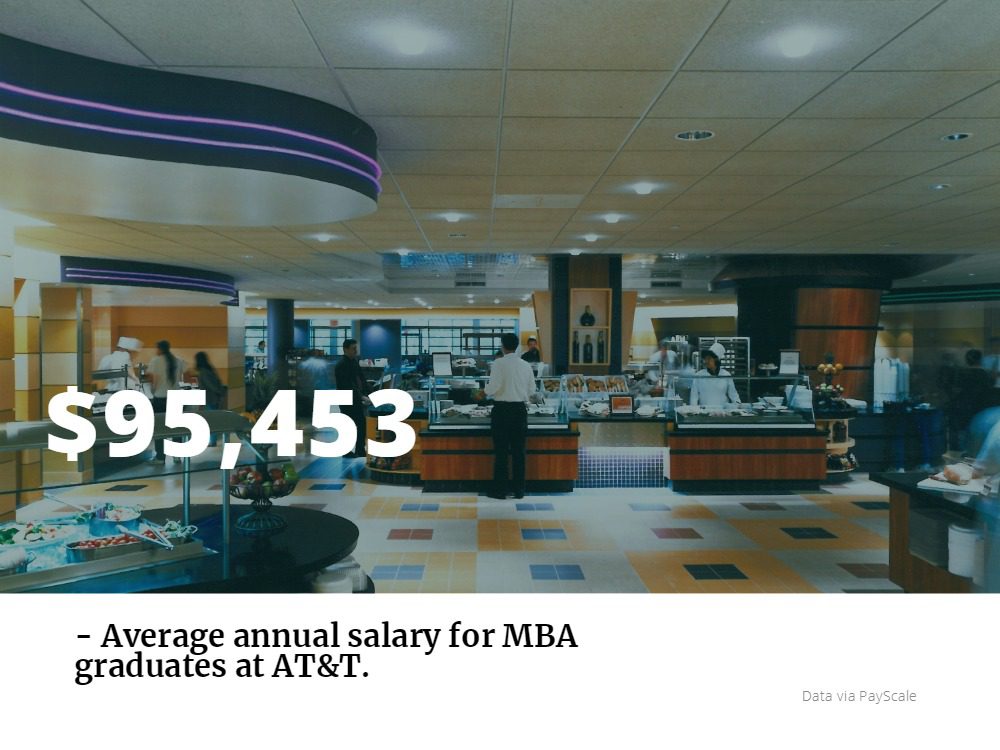
Getting Started
MBA students interested in starting an AT&T career should keep an eye out for the various recruitment events set up through their university, where they can apply on campus and may be selected to interview with college recruiting managers. Because of the company’s heavy investment in a diverse workforce, AT&T also has a strong presence at recruitment conferences like the Forté Foundation for female business leaders, Reaching Out MBA for LGBT candidates, and the National Black MBA Association (NBMBAA).
Many MBAs start their AT&T career through its many internship opportunities, which are found at locations throughout the country and typically last 10-12 weeks. AT&T offers these paid internships a huge variety of fields, such as data analytics, cybersecurity, entertainment group technology, software development, and leadership, among others.
In addition to internships, MBA graduates may apply for one of the many AT&T career development programs. These are full-time, paid rotational programs that may last anywhere from two to three years, providing hands-on experience, exposure and opportunity. Development programs at AT&T include:
- B2B Sales
- Cybersecurity Development
- Engineering and Operations Development
- Finance Leadership Development
- Leadership Development
- Software Development
What Does AT&T Look for in MBA Candidates?
When hiring for its MBA internships and development programs, AT&T looks for students with at least three years of professional experience with the ability to collaborate on complex issues and thrive in a leadership role. The company seeks candidates who are passionate about the role technology can play in people’s lives and its capacity to transform.
In addition to the internships and early career programs, AT&T also looks for more experienced MBA holders for higher-level executive and management positions. For these roles, the company seeks candidates with at least five to eight years in experience related to the role with the ability to work in a team, be a self-starter, and think critically.
Top Business Schools Respond to Repeal of Diversity Guidelines
Diversity in the college admissions process was dealt a blow in early July when the Trump administration withdrew a guidance that encouraged affirmative action in regards to enrollment. The move was announced when the departments of Justice and Education retracted several letters and memos that advised schools on how they could consider diversity in admissions and other various decisions. Continue reading…
Who are the Most Important Female Leaders in Business School Today?
Being a woman in business isn’t easy. While the industry works to improve gender equality, there is still a long way to go. Currently, women only hold 18.1 percent of directorships at publicly held companies. According to the latest report from MSCI, a research and analytics firm for investors, it could be until 2027 before women fill 30 percent of those roles.
And women in business school face similar struggles. Just five years ago, only three of the top 25 schools in the United States had 40 percent or more women enrolled in its MBA programs. And while, currently, nearly half have reached that mark, gender parity is still a ways off. Part of the struggle has to do with female leaders in business school. Currently, there’s only one female dean at a top-tier business school, and there are few other women who’ve made it to the top of their business schools as deans.
The challenges faced by female business school leaders are myriad, which is why we felt it was so important to recognize those women who’ve become prominent leaders in business schools around the world. Continue reading…
Your Essential Guide to Pre-MBA Diversity Conferences, Boot Camps, and Forums
Several organizations are focused on helping increase the pipeline of underrepresented demographics—such as women, LGBTQ students, and those from diverse cultural and ethnic backgrounds—to business school and the larger business world. As part of these efforts, many host MBA diversity conferences, boot camps, and forums providing recruiting and networking opportunities to admitted students headed off to business school in the fall. For eligible participants, these opportunities, designed to provide a head start for students in the MBA recruiting process before they even arrive on campus, are well worth pursuing.
Forté MBA Women’s Leadership Conference
 The Forté Foundation, a non-profit consortium of leading companies and top business schools, works specifically to expand opportunities for women in business through a range of financial and educational opportunities. A centerpiece of these efforts is the annual Forté MBA Women’s Leadership Conference, which will take place this year in Atlanta on June 15 and 16. Registration is now open for both current business school students and those slated to start their MBA programs next fall.
The Forté Foundation, a non-profit consortium of leading companies and top business schools, works specifically to expand opportunities for women in business through a range of financial and educational opportunities. A centerpiece of these efforts is the annual Forté MBA Women’s Leadership Conference, which will take place this year in Atlanta on June 15 and 16. Registration is now open for both current business school students and those slated to start their MBA programs next fall.
The two-day conference provides an opportunity for women pursuing their MBA to connect with hundreds of other like-minded students. Billed as a chance to “learn from highly successful business leaders how to develop stand-out skills and project an authentic leadership style,” it also presents valuable networking opportunities. Highlights of this year’s conference include a meet and greet with Fortune 100 recruiters, more than 150 speakers and presentations from a variety of industries and career paths, and a keynote lecture by USA Today Editor-In-Chief Joanne Lipman. Conference attendees can also take part in the Forté Power Pitch Competition, pitching their ventures to a panel of judges for a chance at cash prizes.
Reaching Out MBA Conference
 LGBTQ+ students and their allies should familiarize themselves, if they are not already, with Reaching Out MBA (ROMBA). This organization focuses on educating current and prospective MBA students on LGBTQ-specific issues and connecting current LGBTQ students with each other and with alumni communities.
LGBTQ+ students and their allies should familiarize themselves, if they are not already, with Reaching Out MBA (ROMBA). This organization focuses on educating current and prospective MBA students on LGBTQ-specific issues and connecting current LGBTQ students with each other and with alumni communities.
“The conference connects more than 1,600 members of the LGBTQ MBA student and alumni community with more than 90 companies looking specifically or LGBTQ talent,” ROMBA Executive Director Matt Kidd explains. Registration is now open for this year’s conference, which will take place in Minneapolis on October 4th through 6th.
ROMBA also helps prepare students in advance of the conference. “We want to ensure they are well positioned for their conversations with our corporate partners at the conference and beyond,” Kidd adds. ROMBA also offers pre-admission mentoring, a summer consulting project, and webinars designed to help students gain a full understanding of the industries represented at the conference.
MBA JumpStart
 Unlike Forté and ROMBA, which focus on specific student demographic groups, other organizations offer pre-MBA opportunities for students from a range of diverse backgrounds. One such organization, JumpStart Advisory Group (JSAG), provides an array of resources and tools through its ongoing Diversity Forums.
Unlike Forté and ROMBA, which focus on specific student demographic groups, other organizations offer pre-MBA opportunities for students from a range of diverse backgrounds. One such organization, JumpStart Advisory Group (JSAG), provides an array of resources and tools through its ongoing Diversity Forums.
JumpStart will host its Brand Management and Marketing Diversity Forum in Philadelphia on May 20th and 21st and its Financial Services and Consulting Diversity Forum in Chicago from July 10th through 13th. In Chicago, finance will be the focus on Tuesday and Wednesday and consulting on Thursday and Friday, although enrolled students interested in learning about both industries can choose to attend the entire event.
“Selected students from top-tier MBA programs attend industry-specific workshops, are introduced to case studies, and are provided with endless opportunities for networking with corporate partner representatives and other incoming MBA students prior to matriculation,” according to the JumpStart website. Students interested in attending should apply here by May 13.
“Diversity for MBA JumpStart is defined as individuals that are under-represented in business including women, Black, African-American, or of African descent, Hispanic, Latin-American, or of Latin descent, Native American or American Indian, Asian and Pacific Islander,” the website notes.
School-Year Fellowship Opportunities
In addition to pre-MBA conferences and workshops, students from diverse backgrounds can also apply for a range of fellowship opportunities once they have been admitted to a leading MBA program.
The Toigo Foundation, which is focused on the finance industry, aims to prepare under-represented MBA students for leadership roles and help foster environments where diverse students can thrive during and after their MBA. Recipients of the Toigo Fellowship participate in two weekends of intense training during each year of their MBA program. These training sessions include leadership development and mentoring, networking opportunities, and the chance to make lasting connections across a range of financial industries. Applications are due by April 30, and financial awards vary depending on achievement and financial need. “The selection of each year’s class of Toigo Fellows is a fluid process and not limited to a specific number,” notes the Tioga website. “Recently, we have selected as many as 80 students (from our applicant pool of nearly 400) to become Toigo Fellows.”
In addition to the nonprofit organizations listed above, many well-known corporations also offer fellowship programs of their own that include financial assistance, conferences, and bootcamp-style experiences for students of color, LGBTQ students, and students with disabilities.
For example, Bank of America Merrill Lynch offers a $40,000 fellowship toward first-year tuition as well as a paid summer internship and opportunities for additional funding in the second year of business school. Goldman Sachs features a similar MBA fellowship program that provides funding to cover first-year tuition, a guaranteed summer associate salary, and a signing bonus that carries an additional $40,000 award upon acceptance of a post-MBA full-time offer. To learn about even more corporate MBA fellowship opportunities, click here.
Now, we understand completely that the thought of another application process on the heels of applying to business school may seem groan-worthy to many. But for students from diverse backgrounds, exploring the opportunities presented as part of these pre-MBA diversity conferences, boot camps, forums, and fellowship programs can certainly make the additional effort pay off.
This article has been edited and republished with permissions from our sister site, Clear Admit.
How Toronto Schools Can Help You Pay for Your MBA
Earning your MBA can be an expensive prospect. In Canada, tuition at the most expensive MBA programs can cost more than $100,000 for full-time and part-time students. This can be difficult for some low-income applicants.
So, what are some Toronto schools doing to help offset the cost of tuition, living, and other expenses to pay for your MBA? Continue reading…
From Just One Woman to 39 Percent of the Class—and Other Ways LBS Has Changed Over the Past 50 Years
The 2017-18 academic year marks the 50th anniversary of the MBA program at London Business School (LBS). Since 1968, the school has offered a two-year Master of Science (MSc) in Business Studies degree program—the original MBA—and has continuously refined its offerings since that time. In celebration of the 50-year mark, LBS is looking back at how far the program has come.
The Beginning
In 1966, two years after London Business School opened its doors, the school launched a two-year Master of Science (MSc) in Business Studies. The first class consisted of 35 men and just one woman, with the average age around 25 years old. The goal of the two-year degree was to prepare students for employment. In fact, according to the website, employment was seen as “one of the most significant aspects of the school’s progress at this stage of its development.”
After graduation, most students joined manufacturing firms, and a few went into merchant banking, management consultancy, and advertising. Their job functions included marketing and financial executives, planning personnel, and personal assistant roles.
As for the feedback on the first year of study, a report on the class stated, “The overall academic performance of the students during the year has been more than satisfactory. The course of studies is arduous and the number of hours of work required is much above average, imposing a considerable workload both on students and staff.”
The Early Years
In the early years of the program, growth was slow but steady. In 1971, the class size grew to 86 students and by 1975, 108 students were admitted, including 16 women. Throughout this time, LBS made various modifications to its program.
- In 1973, LBS introduced the International Management Program, which gave 10 students the change to study abroad in Paris or at New York University.
- In 1978, the International Management Program expanded to include Harvard, Stanford, Wharton, Chicago, and top European institutions.
The 1980s
The 1980s were a time of change for LBS and the MBA program. During these years, banking and finance overtook manufacturing as the top industry for graduates. In addition, LBS continued to increase its international reputation; about half of its class comprised non-British students by the end of the decade, with more 30 nationalities represented. Most importantly, the Class of 1987 was the first to be awarded an MBA rather than an MSc degree. In an annual report, the school stated, “This more accurately and effectively conveys the spirit of the program, and the type of qualifications our students are aiming for.”
- In 1982, LBS introduced a new part-time master’s program. The first class accepted 60 people and allowed students to complete their studies over two and a half to three years while still working.
- In 1984, three more U.S. schools joined the International Exchange Program including Dartmouth Tuck, MIT Sloan, and Northwestern Kellogg.
The 1990s
In the 1990s, LBS adopted a more flexible format for its MBA program. The school added increased training in “soft skills” and introduced computer-based management simulation games. The class size also increased to 271 students, with 79 percent of students coming from outside the United Kingdom. Consulting became the top choice for graduates, and manufacturing shrunk to just 11 percent.
- In 1992, LBS introduced a language requirement where students must be fluent in English and one other language to graduate. In addition, the part-time master’s was re-launched as the Executive MBA.
- By 1996, entrepreneurship became an important part of the program, and the school launched several electives with an entrepreneurial focus, including “Small Business Management” and “Financing the Entrepreneurial Business.”
- 1999 was the first Financial Times Global MBA ranking, and LBS ranked #1 in Europe and #8 in the world—the only non-U.S. school in the top 10.
The 2000s
By the 2000s, LBS had become a global leader in MBA education—and in 2009 it became the first non-U.S. school to top the Financial Times ranking. The MBA program was reformatted for increased flexibility, allowing students to graduate in 15 to 21 months. The class size also increased to 315 students, with 89 percent of the class from 59 countries outside the United Kingdom.
- In 2001, LBS ranked as the best Global MBA by the Financial Times, and Forbes ranked LBS as #1 in Europe and #2 in the world for return on investment.
- In 2003, LBS became the first European school to join the Forté Foundation to increase women in business, and in 2005, women made up 22 percent of the class.
The 2010s
In the last decade, London Business School once again revised its MBA program to give students even greater flexibility. The school also continued to increase its size, welcoming 468 students by 2018—12 times the size of the first class in 1968. In addition, women now make up 39 percent of the MBA class, and students represent 77 different nationalities.
- In 2010, LBS started its Incubator Program to help entrepreneurs. As of 2017, 58 businesses have completed the incubator, raising more than £31 million and creating 440 full-time jobs.
- In 2012, LBS launched the Global Business Exchange (GBE), giving students the opportunity to spend a week in another country with options ranging from South Africa to the United States.
- In 2016, LBS completed its first fundraising campaign, raising £125 million.
To learn more about the 50th anniversary celebration of London Business School’s MBA, visit the school website.
This article has been edited and republished with permissions from our sister site, Clear Admit.
The Secret To Finding An Affordable Washington DC MBA
Washington DC may be a top city for students pursuing their MBAs, but the city’s high cost of living could prove prohibitive for many young Mstudents. Growing rent prices over the past ten years have led DC to be one of the least affordable of the major U.S. metropolitan areas.
Of course, MBA students looking to apply their education to governmental agencies won’t find a better place to do so than in the nation’s capital. And though contending with high rent prices may be unavoidable, many business schools offer students a number of ways to keep the cost of their degree at a minimum.
From scholarships to grants and student work opportunities, business schools in Washington DC ensure that low-income applicants can have equal access to the high quality education their program’s provide. Below are just a few of the opportunities provided to assist low-income applicants at Washington DC MBA programs.
Finding An Affordable Washington DC MBA
McDonough School of Business – Georgetown University
Over $1.5 million in aid is available to MBA applicants through merit based scholarships at Georgetown University’s McDonough School of Business. All students are eligible for these grants, but it is advised to apply for the program early to best position yourself for consideration. International students in need of additional funding may also apply for external scholarships and private loans specifically for international students. The university has compiled a list of common lenders that students may want to consider here.
McDonough also provides scholarship opportunities through the Consortium, a group whose goal it is to reduce the under-representation of blacks, Native Americans, and Hispanic students in business education. As a member school, a number of scholarships are also available at McDonough for students admitted as part of the Consortium.
University of Maryland R.H. Smith School of Business
Roughly 85 percent of MBA students at UMD Smith receive merit based awards to help fund their education. Between scholarships, fellowships need-based awards and assistantship opportunities, students have a number of opportunities to reduce their tuition and keep their MBA affordable. Awards such as the Dean’s Award of Smith award provide two years and one-year of full scholarship and fees. Students may also find additional opportunities for scholarships through the university’s organizational partnerships, such as the Forté Foundation or management Leaders for Tomorrow.
YOU MAY ALSO LIKE: Georgetown McDonough Offers New FinTech Elective
George Mason University School of Business
The George Mason University School of Business provides one of the best values in education, demonstrated through the high success rate of alumni and the fact that Mason alumni have the lowest student loan default rates in Virginia.
Mason offers a number of financial aid opportunities through grants, scholarships, work-study employment, and loans. Every year, the school offers millions of dollars to incoming students, including fellowships for graduate students. The Office of Student Financial Aid is dedicated to assisting each student in finding the financial assistance that is needed for their degree.
George Washington University School of Business
The George Washington University School of Business offers a number of different ways for students to reduce the cost of their MBA degree. Each year, graduate students may apply to a number of different fellowships, available through the university as well as private foundations and agencies. At the Office of Graduate Student Assistantships & Fellowships, students can search through these numerous opportunities and see which scholarships best fit their qualifications.
GWU also offers Financial Aid based on the need of each students. Eligible applicants can apply for need-based aid by filing the Free Application for Federal Student Aid (FAFSA).
Howard University School of Business
MBA students at the Howard University School of Business may be eligible both for federal student aid, based on need, and a variety of scholarships, which are given based on merit and other factors. Scholarships range, and may cover up to full-tuition, while others provide partial funding. Howard MBA students may also pursue loans for tuition through the ACCESS Loan Program, Alternative Education Loans, or other private loan services.
Kogod School of Business – American University
The Kogod School of Business at American University ensures that its high quality education can be affordable for all. Roughly 80 percent of all students receive financial aid of some kind, with almost $85 million awarded just to the undergraduate population. Kogod offers both need-based aid and merit scholarships. Students may contact the Graduate Admission Office at Kogod for more information on the scholarships available to them, but all applicants who demonstrate excellent academic credentials will be considered for these honors—a separate application process is not needed.
How Chicago Business Schools are Helping Low-Income Students
Business school doesn’t come cheap, which often means that prospective students who could benefit the most from the lucrative career opportunities that come with an MBA either don’t end up at top tier programs or don’t end up applying at all.
The flip side is that MBA programs now more than ever desperately need more diverse perspectives in their classrooms—yet it seems the same ol’ folks end up in these slots every year. Many in academia are woefully ill equipped to meet the challenges of a more diverse and inclusive business landscape but there are a handful of MBA programs that have begun to catch up and take strides to make business educations more accessible to qualified low-income applicants.
The Chicago metro just so happens to be packed to the gills with high-ranking MBAs that take initiative to help promising candidates. Let’s take a deeper dive into four of our favorite Chicago MBA programs that have historically lent a hand to low-income students.
Northwestern’s Kellogg School of Management
Situated just above the city limits on Chicago’s North Shore (see: John Hughes movies), the Kellogg School of Management is among the nation’s most coveted MBA programs—and among the most generous too. Kellogg offers a variety of different scholarships based on merit or financial need for newly admitted students and rising second-year students, as well as external scholarship resources through the Office of Fellowships for Graduate Students.
YOU MAY ALSO LIKE: Tech Grads Surge in New Northwestern Kellogg Employment Report
Director of Admissions Melissa Rapp explains that Kellogg understands that funding a business school education can be challenging. “To help students meet this challenge, a variety of merit scholarships are offered, including diversity scholarships, such as James P. Gorter Scholarship which is awarded to under-represented backgrounds in the Two-Year MBA or MMM program, and academic, professional or special interest scholarships, such as the Health Enterprise Management Scholarship which is awarded to an outstanding student interested in pursuing a career in healthcare.”
UIC’s Liautaud Graduate School of Business
UIC Business provides opportunities to empower graduate students with a dynamic, proven, business education, and an immersive city experience that enhances both quality of life and career opportunities. Many UIC Business students have financial need and the school makes a point to acknowledge its dedicated staff of advisors who help every student navigate the financial aid process. Alanna O’Connor, Assistant Dean for Student Recruitment and Sid Balachandran, Program Director, explains:
“As a state institution we strive to maintain costs for students and are committed to providing a world-class business education at a campus nationally recognized for its diversity. We offer our competitive programming at a more affordable value than some of our peer schools. The affordability of our program is an important part of providing a high return on investment. Multiple tuition waivers, scholarships, assistantships—teaching or research—are also are available for students who qualify.”
Notre Dame’s Mendoza College of Business
The Mendoza College of Business walks the walk when it comes to a socially engaged, community-centered vision of business. Part of that mission entails actively courting and supporting stellar applicants who might demonstrate need, particularly women through the Forte fellows program.
“As a sponsor school for the Forte Foundation, Notre Dame is committed to launching women into successful business careers. Forte Fellows are recognized for their academic aptitude, leadership, and future potential,” the school notes. “Forte Fellows are granted special access to the Forte community, including leadership conference access, mentoring and career development opportunities, and network development.”
It also means that students with deep interests in corporate social responsibility might do well to apply to Mendoza. According to Mendoza, it awards more than 65 percent of one-year MBA students merit-based fellowships based on “academic performance, prior work experience, GMAT or GRE scores, leadership potential, letters of recommendation, and each applicant’s personal statement.”
Lake Forest Graduate School of Management
In its commitment to “attract and develop outstanding leaders who change lives,” Lake Forest has a number of MBA-centric fellowships and scholarships:
- The President’s Scholarship supports “proven leaders who have achieved measurable results, demonstrate a high level of self-awareness and adaptability, and are committed to developing their leadership potential.”
- The Emerging Leaders scholarship supports students who “demonstrate exceptional leadership potential and show the ability and desire to deliver meaningful results, think innovatively, and gain a heightened level of self-awareness.”
- The $3,510-7,000 Leadership Scholarship supports students who demonstrate financial need and “strong leadership potential, verbal and written communications skills, intellectual ability, and motivation.”
- The Yomine Scholarship supports students “are employed in a manufacturing position” who demonstrate financial need
- The $3,510 Tuition Assistance Grant supports “candidates who are not eligible to receive tuition assistance from their employer.”
- The Gariano Scholarship supports “women with an undergraduate nursing degree” who demonstrate financial need.
Loyola’s Quinlan School of Business
The Loyola Quinlan School of Business offers two merit-based scholarships to MBA students: the Dean’s Merit Scholarship, which typically covers 1-2 courses, awards “stellar academic performance” and the $1,000-10,000 Graduate Business Student Scholarship, which supports students “who have proven academic success and demonstrated financial need.”
Top MBA Programs Gain Ground for Gender Parity
The Forté Foundation today released its annual women’s enrollment report for full-time MBA programs at its member schools, which include many of the top business schools in the United States and abroad. This fall, women’s MBA enrollment climbed to a global average of 37.4 percent, up 4 percent over 2013 figures, when the global average was 33.4 percent women.
In fact, the last five years of enrollment data at Forté member schools reveal steady gains in the percentage of women. For U.S. schools, women’s enrollment reached 37.8 percent this fall, up from 37.1 percent in 2016, and 34 percent in 2013. And for schools outside the United States, the gains have been even greater. In fall 2017, non-U.S. Forté member schools enrolled 36 percent women, up more than 3 percent year over year (from 32.8 percent in 2016) and almost five percent since fall 2013 (from 31.1 percent).
“I’m always heartened anytime I see a 1 percent trend overall,” Forté Executive Director Elissa Sangster told Clear Admit. “Year by year, it’s pretty significant for this group of schools to steadily have that same number increase—because it’s a lot of work to get more women into the pipeline and to matriculate those women,” she continued. “But this year, in particular, seeing those other schools outside the U.S. go up 3.4 percent in one year was very surprising.”
Two Schools Reach 45 Percent Women, Highest on Record
In fact, there were many signs beyond these overall statistics that show continuing progress toward gender parity among MBA programs. For one, 17 Forté member schools this fall enrolled 40 percent or more women—as compared to just two schools that reached this milestone in 2013. A total of 26 schools enrolled more than 35 percent women, more than twice as many as in 2013 (12 schools). Best yet, for the first time ever, two schools reached 45 percent or more women enrolled—the University of Pennsylvania’s Wharton School and George Washington University School of Business. And three more schools—two in the United States and one in the United Kingdom—were close behind at 44 percent.
“The 1 percent [overall year-over-year gain] may seem small, but we’re seeing 17 out of 50 schools hit over the 40 percent mark, and that’s huge,” said Sangster. “To start seeing schools trend that direction makes a big impact because it’s a hard thing to obtain for any school at this point.”
Not only that, the progress demonstrates that gender parity is attainable, Sangster stressed.
“Although women’s enrollment in business school is a slow and steady growth story, at this rate we could reach an average of 40 percent women’s enrollment in top business schools in less than five years and 50 percent by 2030,” she said in a Forté press release. “Why is this significant? There is evidence that an MBA can provide both career advancement and significant pay gains for women, giving them greater economic mobility. And efforts to support women to pursue an MBA can contribute to a more diverse leadership pipeline at companies.”
The Forté Foundation is a non-profit consortium of top business schools, corporations, and the Graduate Management Admission Council, and its efforts to move the needle toward gender parity in the MBA and business more generally are widespread. Launched in 2001 after the results of a landmark research study, Women and the MBA: Gateway to Opportunity, Forté now has 51 member schools: 39 in the United States, four in Canada, and eight in Europe. It also has numerous initiatives to help close the gender gap.
“Our college efforts are very robust and have been growing over the last five years. We are connecting with women about their career options and bringing the MBA into the conversation early,” explained Sangster. “It’s important for women in their university years to really understand what type of opportunities they have, to have access to role models, and to know the landscape of what’s to come. I think Forté can be a real guide in that. We know that having those conversations with young women is critical.”
A few of Forté’s initiatives include
- The annual Forté MBA Women’s Leadership Conference, which brings together hundreds of women MBA students and top companies each year to help attendees explore career paths, meet recruiters and mentors, and hear from influential businesswomen;
- The Forté College to Business Leadership Conference, a similar event designed to introduce undergraduate women to career opportunities and summer internships at top companies;
- The “Rising Star” pilot initiative, launched in September 2015, which helps undergraduate women become well-informed about their many career options, and
- MBALaunch, a hands-on, 10-month program that provides guidance, resources, and ongoing feedback about the business school application process through monthly webinars, peer group meetings, and feedback from experienced advisors.
“MBALaunch allows us to give women unprecedented access to business schools, alumnae, admissions representatives, and admissions experts—and also to give them a cohort of like-minded women who can support them and encourage them through the business school application process,” Sangster said. In the past, many women went through the application process alone, she continued. “MBALaunch allows us to present the best version of those women candidates to business schools. That’s what makes a critical difference in terms of admission into your stretch business school.”
The Forté Foundation also awards a variety of scholarships through its Forté Fellows program. The program has exploded from just 33 inaugural scholarships awarded in 2003 to 1,300 scholarships awarded to the incoming Class of 2017 and another 1,100 scholarships awarded to second-year students in the Class of 2016. Overall, since 2003, Forté schools have awarded a staggering $142 million in scholarships to Forté Fellows.
It Takes an Entire Community Effort
To augment Forté’s initiatives, top business schools can continue to make progress on their own by keeping a steady eye on gender parity and getting the entire school involved in the process, said Sangster.
“The schools that are doing a great job at consistently keeping their numbers high have an entire community effort focused on the goal of gender parity,” Sangster said. “It’s not just the admissions team reviewing applications and making decisions. It’s the students enrolled in the school being actively involved in recruiting and matriculating those students. It’s the alums making phone calls and participating in local coffees or teas to talk about their own story and to reduce concerns about the investment that women will be making.”
“It’s not just one small group of people; it’s a team effort, a community effort,” she continued. “The schools that are maintaining their numbers and seeing a steady climb have a full-court press.”
So which schools are leading the way? The following 17 Forté member business schools have 40 percent or higher women’s enrollment:
- Alliance Manchester Business School
- Columbia Business School
- Dartmouth College (Tuck School of Business)
- George Washington University School of Business
- Harvard Business School
- Imperial College Business School
- Massachusetts Institute of Technology (Sloan School of Management)
- Northwestern University (Kellogg School of Management)
- University of California Berkeley (Haas School of Business)
- The University of Chicago (Booth School of Business)
- University of Michigan (Ross School of Business)
- University of Oxford (Saïd Business School)
- University of Pennsylvania (Wharton)
- The University of Texas at Austin (McCombs School of Business)
- University of Toronto (Rotman School of Management)
- Yale School of Management
- York University (Schulich School of Business
And the following nine schools have 35 percent or greater women’s enrollment:
- Arizona State University (W. P. Carey School of Business)
- HEC-Paris
- London Business School
- New York University (Stern School of Business)
- University of California – Los Angeles (Anderson School of Management)
- University of Cambridge (Judge Business School)
- University of Illinois Urbana–Champaign (Gies College of Business)
- University of Virginia (Darden School of Business)
- Washington University in St. Louis (Olin Business School)
To access the full Forté report, click here.
This article has been edited and republished with permissions from Clear Admit.
The Top 5 Reasons Diversity MBA Conferences Should Be on Your Recruiting Calendar
Pictured above: Tuck second-year MBA students Bianca Goins, Sadé Lawrence, and Jodine Gordon.
More than 10,000 MBA students, business school representatives, recruiters, and business executives filled the Pennsylvania Convention Center in Philadelphia late last month for one of the largest career conferences serving minority professionals. The conference has been around since 1970, but for the first time this year the National Black MBA Association (NBMBAA) and Prospanica, the association of Hispanic professionals, joined forces to present it. The result was an incredible opportunity for attendees to network with companies and each other, take advantage of career development programming, and interview for and secure job offers from hundreds of companies spanning multiple industries.
Cornell’s S.C. Johnson Graduate School of Management had a group of approximately 55 students attend, a mix of first-year and second-year students, according to Cynthia Saunders-Cheatham, Executive Director of Johnson’s Career Management Center.
“It was double what we have had in recent years, and perhaps the largest attendance we ever had for an MBA diversity conference,” she said. “Having a joint NBMBAA/Prospanica conference, in addition to the Philadelphia location that was driving distance away [from Ithaca, NY, where Johnson is located], helped to drive attendance.” The connections that students made while there have already resulted in multiple job offers, she added.
While securing a job or internship is a primary reason many MBA students choose to attend the National Black/Prospanica conference and others like it, that’s just one of many potential benefits events like this offer. Given that this most recent conference was right here in our hometown of Philadelphia, we went to check things out for ourselves. Through conversations with attendees, school representatives, and recruiters, we’ve compiled the following list of reasons why this year’s crop of applicants should be sure to add diversity MBA conferences to their recruiting calendar next summer and fall.
1. Unparalleled Recruiter Access—Including Many That Don’t Come to Campus
The Career Expo, which took place on the last two days of the five-day National Black/Prospanica conference, filled a cavernous hall in the Convention Center and included booths from close to 300 companies spanning dozens of industries. Among them were coveted post-MBA tech employers like Google and Amazon, consulting industry leaders including Bain & Company and Accenture, and financial services firms such as BlackRock, Bank of America, and Morgan Stanley. There was a continuous gaggle at the Google booth, and one of its MBA internship recruiters, Tanya Choudhury, had to resort to wearing a sign by the second day explaining that she’d lost her voice.
Big pharma and healthcare were also well represented, with booths attended by recruiting representatives from drug maker AstraZeneca to medical products and equipment company Zimmer Biomet and many in between. Leading consumer packaged goods (CPG) firms including PepsiCo, General Mills, and Proctor & Gamble were also there, as were oil and gas giants like BP, Chevron, and Exxon.
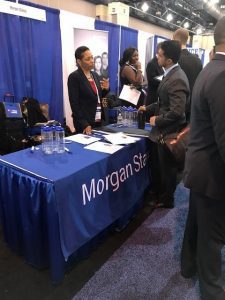
Morgan Stanley was one of almost 300 exibitors in the conference’s packed Career Expo.
But there were also plenty of organizations that are perhaps less top of mind as potential MBA recruiters—the Central Intelligence Agency, the U.S. Department of State, Teach for America, and USAID, for example—who were just as eager to share how highly they value the MBA skillset. Dozens of leading business schools also had booths, largely to provide support and serve as gathering places for students who were attending, but also with an eye out for promising diverse talent. For example, Roberto Martinez, a Senior Talent Acquisition Consultant for Dartmouth College—home to the Tuck School of Business—was eagerly distributing glossy handouts touting the school’s varied career opportunities, commitment to diverse hiring practices, and excellent benefits. “We’re here not only to support students but also to hire more diverse staff to campus,” he said.
For Tuck second-year MBA student Bianca Goins, the breadth of companies at the expo was a big part of the draw. “I wanted a diverse group of companies to look at in a single spot,” she said. “There are so many companies here, and as second-year you can really come and pick and choose the experiences you want to have.”
Tiffany Anderson, a second-year student at Emory’s Goizueta Business School, was also impressed by the sheer number of companies present. A self-proclaimed conference veteran, she also attended National Black last year, as well as conferences presented by the Forté Foundation, the Consortium for Graduate Study in Management, Management Leadership for Tomorrow, and JumpStart. “Out of all the diversity conferences, I would certainly say this is the flagship,” she said. “Wow! There are A LOT of companies here,” she recalled thinking to herself as she walked in. More so than last year, before National Black and Prospanica teamed up, she added.
“I have seen the most people—students from many different schools and recruiters from many different functional areas of interest,” she continued. “It seems to be the most diverse in terms of attendees, degree of programming, and companies in attendance. For the majority of people, this is going to be one of the best to attend.” Anderson estimates that there were probably 30 or so Goizueta students there, a mix of first- and second-years.
2. Multiple Touch Points and Opportunities for Face Time
For some students, certainly, the primary purpose in attending the conference is to land a job. Second-year IU Kelley School of Business MBA student Henrique Barbosa, a native of Brazil pursuing travel hospitality, had a simple answer when asked why he was there: “To get a job!” He acknowledged that most of the firms he was interested in only conduct first-round interviews at the conference followed by second-round interviews on site, which lessened the likelihood of his leaving with an offer in hand. “But it would be great if it happened,” he said.
But several other students were less interested in job or internship offers—or even in early round interviews. For Jodine Gordon (Tuck ’18), the biggest factor in her decision to attend was hearing success stories from Tuck grads whose higher-level touch points with conference recruiters later helped them secure offers. “I have a couple companies on my list, but really I just want to meet as many people as possible so they can get to know me and I can get face time,” she said.
Sadé Lawrence, also a second-year student at Tuck, was likewise attracted by the opportunity to get in front of recruiters in person. “For a lot of opportunities you might be interested in, you start online at a website, applying through data base,” she said. “But coming here they now have a face with your name, and there are all kinds of organic connections that can happen,” she added. “It’s kind of amazing that you are able to build connections with people even at such a big conference, but you are. You make contacts and get lots of face time—so much more so than you can blindly through a website,” she continued. “What I have heard more of is people have an interaction with a recruiter here that leads to an interview later—here is more about entering the pipeline.”
Tuck’s Goins has taken the opportunity to network with recruiters who don’t make it to Tuck’s campus, but also those who do. “With every interaction, you are getting a more nuanced understanding of the company and can take that information and use it in subsequent interactions.”
3. Valuable Chances to Network with Peers
Goizueta’s Anderson interned in operations at Google over the summer—an opportunity she got through another diversity conference—and has been offered a full-time position on the tech giant’s Mountain View campus after she graduates. Despite having that full-time offer in hand, attending the conference still made lots of sense.
Kelley School second-year student Luis Vilchez Kupres, a native of Peru, also converted his summer internship—in supply chain operations at Cummins—into a full-time offer. So his reasons for attending the conference were not to get a job. ”I am here to support fellow Kelley first- and second-years and network a little more,” he said. He also gets to reconvene with students from other schools he met at last year’s Prospanica conference. “Often, you connect with somebody and they will help you connect with someone else,” he said. “Networking definitely helps—even among other MBA students.”
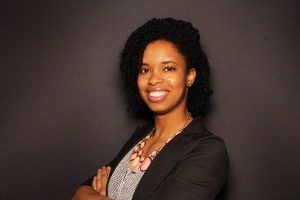
Tiffany Anderson, Goizueta MBA ’18, a diversity MBA conference veteran
For the Google-bound Anderson, the value of peer networking can’t be stressed enough. Being able to connect with students from other schools is the part she finds most enjoyable—but it’s also strategic. “When candidates are selecting a school they like to look at the size of the network they are going to get—and that’s great,” she said. “But the way I see it, I don’t have to be at Stanford or Wharton because I have friends at Stanford and Wharton. So in a way that’s kind of my network, too.”
“You have that domino effect,” she continued. If she’s trying to connect with someone at a company where she doesn’t have a contact or her classmates don’t have contacts, she can reach out to a friend at another school to see if there’s someone in their network. “Some might say, ‘Well, they’re a peer, they’re not an employer, they’re not going to get me a job.’ But there is so much more benefit to expanding your network. I don’t think everyone understands that.”
Of course, peer networking can be a two-way street. “My motivation to expand my network comes from wanting to help others as well,” Anderson said. “When you are part of these diversity networks, one of the great things is you are going to have a friend who says, ‘Do you know someone who can help me with this?’ And I can say, ‘Well, I met someone at a conference who does that very thing and I’m happy to put y’all in touch.’”
How the Chicago Booth School of Business Helps Low-Income Applicants
U.S. News and World Report lists University of Chicago’s Booth School of Business among its top three best business schools in the country. But with the school’s estimated tuition (including living expenses) for the 2017-18 year at $103,759, Booth may not sound like a practical option for a number promising candidates. Though the $126,937 average base salary of graduates is definite proof of return on investment, for many, the cost of tuition may make the idea of earning a Booth MBA seem impossible. Fortunately, the myriad loan and scholarship options available at Booth may make a Booth MBA more feasible for students from all economic backgrounds.
Those of you craving a challenging higher education experience at one of the most prestigious institutions in the U.S. can breathe a sigh of relief. Below, we’ve laid out some of the resources available to help low-income applicants fund their MBA education at Booth School of Business.
Scholarships and Fellowships
Though Booth does not offer need-based financial aid, there are a plethora of merit-based scholarships and fellowships available to promising students. According to the school’s website, awardees are chosen based on the quality of their interview, their academic merit, their prospective concentration, competitiveness, career goals, and life experiences.
Specialized scholarships are available to minority students, veterans, and students with outstanding scholastic achievements. There are also industry-specific opportunities, such as the Canfield Private Equity Fellowship, which is specifically geared toward students with a background in private equity or investment banking, and even includes an internship at a private equity firm.
Take a look at some of the more prominent Booth scholarships available:
Chicago Booth Merit-Based Award
- This general scholarship is awarded to select students at the time of admissions based off, according to the school, “who have excelled in academics, work experience, and service to the community.”
George J. Stigler Fellowship
- This awarded is granted to students who excel in fields such as law, economics, and business.
Forté Foundation Fellowship
- This full-time MBA awarded is gifted to students through the forward-thinking Forté Foundation every year for students that “exhibited exemplary academic, team, community, and/or creative leadership, and are committed to advancing the interests of women in business.”
Distinguished Fellowship
- Students granted this high-ranking fellowship receive a “stipend and mentorship from Harry L. Davis, the Roger L. and Rachel M. Goetz Distinguished Service Professor of Creative Management.” The fellowship covers a student’s entire tuition.
David W. Fox Scholarship
- Another full-tuition award, the David W. Fox Scholarship is gifted to students that have previously or are currently serving in U.S. military. The school notes, “Students must demonstrate outstanding leadership, academic and extracurricular achievements, and a commitment to advancing the interests of those having served in the military.”
You can learn more about Booth’s scholarship opportunities here.
Loans
Booth students who are U.S. citizens or permanent U.S. residents can apply for a variety of federal or private student loans. Students looking for federal loans can choose a Direct Unsubsidized Loan or a Direct Grad PLUS Loan. To qualify for the Direct Unsubsidized Loan, students must be enrolled in at least 200 units each quarter. The maximum amount students can receive with this loan is $20,500 per year. Students who require more than $20,500 per year can apply for the Direct Grad PLUS Loan, which has a much higher cut-off. With this loan, students can receive up to the total cost of attendance (minus any other outside financial support). Students who opt for private, credit-based loans can also borrow up to the total cost of attendance, not including separate sources of financial assistance.
International students also have the option of leaning on loans to help finance their MBA. Booth provides loan options for international students without U.S. cosigners, as these students may not be eligible for private loan options. Those with U.S. cosigners, however, have a wide selection of private loan opportunities available to them.
Do Women Entrepreneurs Get Less VC Funding? Wharton and Columbia Researchers Find a Large Gender Gap
Over the last few years, there has been a lot of talk about more women in business. From the promotion of organizations like the Forté Foundation—which seeks to enhance women in business—to CNBC claiming “the Golden Age for women entrepreneurs has finally begun,” enterprising women seem to be everywhere. Unfortunately, this doesn’t mean that the deck is stacked in their favor. In fact, researchers from Columbia Business School and The Wharton School found the opposite was true.
The Gender Gap in Startup Funding
In a paper published in the Academy of Management Journal titled, “We Ask Men to Win & Women Not to Lose: Closing the Gender Gap in Startup Funding,” researchers looked at how women fared compared to men when they were trying to get funding for their startups.
After reviewing footage from the TechCrunch Disrupt startup competition, the researchers found that women were asked entirely different types of questions about their companies compared to their male counterparts. Men received more questions about their project’s potential for growth, while women received questions on the opposite end, about their potential risks and losses. This difference in questioning had a measurable impact on the funding each startup received.
The research paper, written by Dana Kanze (a Columbia Business School Ph.D. student), Laura Huang (a Wharton School Professor), Mark A. Conley (a Columbia Psychology Ph.D.), and E. Tory Higgins (a Columbia Psychology Professor), sought to delve into the enormous gender gap revealed in venture capital funding. According to the paper, only 2 percent of VC funding goes to women entrepreneurs in spite of the fact that women own 38 percent of U.S. businesses and represent 7 percent of venture capital firms.
One of the keys to this drastic difference in funding was how VCs—both male and female—framed funding questions for women-created businesses. Kanze explained the thought process in a Forbes article.
“According to the psychological theory of regulatory focus, investors adopted what’s called a promotion orientation when quizzing male entrepreneurs, which means they focused on hopes, achievements, advancement, and ideals,” Kanze said. “Conversely, when questioning female entrepreneurs, they embraced a prevention orientation, which is concerned with safety, responsibility, security, and vigilance.”
Inside the Research
To study how this difference in questioning impacted women and men entrepreneurs, the research team reviewed the Q&A sessions of 189 startup entrepreneurs—12 percent of whom were women—held by 140 prominent venture capitalists—40 percent of whom were women. Using software to analyze each session, researchers discovered that 67 percent of questions posted to men were promotion-oriented while 66 percent of questions posted to women were prevention-oriented.
In the end, the study found that this difference in questioning led to a huge difference in VC funding. Among comparable companies, the research team found that businesses that were asked prevention-oriented questions raised (on average) $2.3 million in funds in 2017, while their promotion-focused counterparts raised $16.8 million—nearly seven times more.
“In fact, for every additional prevention question asked of an entrepreneur, the startup raised a staggering $3.8 million less, on average,” Kanze told Forbes. She continued, saying, “Controlling for factors that may influence funding outcomes—like measures of startups’ capital needs, quality, and age, as well as entrepreneurs’ past experience—we discovered that the prevalence of prevention questions completely explained the relationship between entrepreneur gender and startup funding.”
However, there was some good news. For female entrepreneurs who received prevention-focused questions but responded with promotion-type answers, they were able to raise $7.9 million, versus $563,000. This suggests that regardless of how VCs phrase their questions, entrepreneurs can recover much of their funding potential if they answer in the positive.
To test their findings, the research team conducted an experiment that recreated the TechCrunch Disrupt conditions with 194 VCs—30 percent of whom were women—and 106 entrepreneurs—47 percent of whom were women. After removing startup specific details, the team asked the VCs to allocate $400,000 to their chosen entrepreneur.
According to the Kanze in a Harvard Business Review article, the team found that: “Angel investors allocated an average of $81,113 to startups in the prevention question, promotion answer condition—1.6 times larger than the $52,369 average allocated to those in the prevention question, prevention answer condition. Similarly, ordinary investors gave an average of $96,321 to the prevention question, promotion answer condition—1.7 times larger than the $55,377 average given to the prevention question, prevention answer condition.”
Speaking with Professor Laura Huang
To gain additional insight into the results of the research paper, we spoke with Professor Laura Huang at the Wharton School. Here’s what she has to say.
- What was the most surprising result that came out of your study?
“It was surprising that both men and women investors were equally as likely to ask prevention-focused questions to women, as opposed to promotion-focused. It wasn’t that men were the only ones biased, but that both genders were equally as likely to be biased.”
- Do you have any advice for female entrepreneurs looking to raise venture capital?
“Stop it in its tracks. When you see something like this happening, stop it immediately and redirect the response so that you’re making yourself on equal footing. Don’t allow that train of thought to go through where you’re getting asked prevention-focused questions and investors are focused on the risk. Answer the question that’s asked but redirect your response toward possibilities and success.”
- How do you think VC funding can change for the future to close the gender gap?
“Part of it is an awareness on the investors’ side. It’s also up to the entrepreneurs to redirect each question toward the right focus. A lot of this gap is implicit. Investors don’t realize they’re asking prevention-focused questions of women; they just automatically ask certain questions to each gender. Awareness around the tendency toward prevention-focused questions for women entrepreneurs and a focus on redirection toward promotion is key.”
Babson College Helping Empower Women in School and Beyond
Despite improvements in recent years, women remain underrepresented in MBA classrooms and don’t participate in the global economy to the same extent as men. It’s a persistent issue, but one that many business schools and foundations are working to address by demonstrating successful female leadership and implementing programs to empower women in business. As a part of that effort, Babson College and the F.W. Olin Graduate School of Business recently announced that Liberian President Ellen Johnson Sirleaf would address their undergraduate and graduate students during their commencement ceremonies. Continue reading…
The McCombs Scholarships You Need To Know
For many students looking to pursue a graduate business degree, the cost of an MBA can be a huge deterrent. As an unfortunate result, many qualified and ambitious student choose to not pursue the furthered education they deserve. Luckily, most business schools offer exemplary scholarship remedies to help alleviate costs. For those looking to pursue an MBA at Texas A&M University, we’ve listed the McCombs scholarships you need to know.
Continue reading…
The HERWorld Energy Forum at Rice’s Jones Graduate School
Bridging the gender gap in business has been an increasingly hot topic in recent years. As evidenced by the Fearless Girl statue facing off against the Charging Bull on Wall Street, and the women’s marches that took place across the country earlier this year, both women and men are speaking up for equality in the business world. The recent HERWorld Energy Forum is yet another example. Continue reading…
Top Scholarships at Columbia Business School
Earning an MBA from Columbia Business School (CBS) is an incredible opportunity. It is no secret that CBS offers an enviable education, but it is also located in the heart of New York City, where MBA students will be surrounded by opportunities and industry giants. Of course, being in the fastest-paced, most populous city in the United States comes at a price. Literally. New York is listed as number one on Investopedia’s Top 10 Most Expensive Cities in the U.S. Luckily, CBS offers a wealth of scholarships to make grad school in the city more manageable.
Merit-Based Scholarships
Merit-based scholarships are an excellent option for motivated students with impressive undergraduate GPAs and work experience. Also, if students do not receive a fellowship in their first year, they will have another opportunity in their second year.
• Forté Foundation Scholarship: The Forté Foundation offers scholarships to outstanding women through their Forte Fellows program. The fellowship exists to encourage larger numbers of women to pursue an MBA education. There is no application information required from students at CBS, as nominees are selected by the school’s director of admissions. Forté Fellows receive multiple benefits, including participation in the MBA Women Leadership and Financial Services FAST Track Conferences. Students in the program are also included in the Forté Fellow resume book, which is distributed to Forté Sponsor companies like J.P. Morgan and IBM Global Business Services.
• Toigo Fellowship: CBS is one of the Robert Toigo Foundation’s featured MBA programs. The Toigo Foundation’s mission is to encourage diversity in finance, so this fellowship is available to under-represented groups. Driven minority students will be eligible for consideration. Fellows attend a weekend summer session to prepare them for business school. During this session, students are assigned mentors to guide them throughout school and their careers.
• Columbia Fellows Program: Columbia Fellows is available only for the first year of the program. The scholarship includes a partial- or full-tuition award for applicants who have shown the creativity and initiative to be true leaders in business.
• Board of Overseers China & India Fellowships: This fellowship is available to students from China and India. Scholarships are awarded by the Board of Overseers, which is comprised of industry giants across a variety of fields.
• Meyer Feldberg Distinguished Fellowship Program: This fellowship is extremely competitive and is granted to students who have shown outstanding leadership skills and academic initiative. Students applying must demonstrate an impressive track record in areas like entrepreneurship and social ventures. Fellows are given full tuition and lifelong membership in the prestigious network of award recipients and donors.
.
• R.C. Kopf Fellowships: The R.C. Kopf Fellowship is granted to students with an interest in international business. Italian, French, British and U.S. citizens can all earn the Kopf Fellowship. Applicants should be accomplished in academia, but also exhibit personal and professional behavior that makes them an asset to the community.
• Gerardo Werthein Scholarship: This scholarship is specifically for MBA students who have lived or studied in Argentina and who are interested in returning to work in Argentina. The scholarship is granted based on financial need.
• Ela Lemelbaum Scholarship: Israeli students are eligible to receive the Ela Lemelbaum Scholarship, which provides tuition support options for both first and second years of study. Preference goes to students who have studied at the Interdisciplinary Center in Herzliya, Israel. This scholarship is renewable during the second year.
Other Scholarship Opportunities
CBS also offers a variety of need-based scholarships to students, which may yield tuition support ranging from $7,500 to $30,000. Need-based scholarships are based on every aspect of a student’s assets. About 50 perfect of applicants are granted need-based awards. These scholarships are automatically renewed during a student’s second year. There is a rigorous four-part application process. Students may also seek out and apply for external scholarships.
Discover How the Smith School Promotes Women in Business
What were more than 200 Girl Scouts doing at the University of Maryland’s Robert H. Smith School of Business? They were attending Cookie College, of course!
On December 10, 2016, more than 225 Brownies and Juniors from kindergarten to fifth grade headed to the Robert Smith School of Business to learn about the business of selling cookies. “The girls learned life skills like goal setting and money management that will help them in all aspects of life,” Sara Tyler, program specialist at the Girl Scout Council of the Nation’s Capital, said in a news release. “It sets them up for life.”
The girls also received additional benefits, such as learning about higher education and meeting female role models. It was an empowering event that was women-led and girl-attended, and it was all a part of the Robert Smith School of Business’ broader initiative: 50/50 by 2020. Continue reading…
3 Rotman Grads Named Canada’s Most Powerful Women
If there’s one thing that everyone can agree on, it’s that women are necessary for business. In fact, companies with a female on the board of directors, on average, have a 53 percent higher return on equity. The issue is that though women represent 47% percent of the workforce, they only represent 17 percent of boardrooms, and 4.8 percent of CEOs among the Fortune 500 companies, according to the Forté Foundation.
That’s why University of Toronto’s Rotman School of Management has made it a priority to promote women in business. And their efforts have recently been rewarded with both a Rotman professor and two alumni named to the Women’s Executive Network (WXN) list of Canada’s Most Powerful Women for 2016. The list featured 100 women in total, including several graduates of the Rotman School’s Judy Project and Executive Programs. Continue reading…


